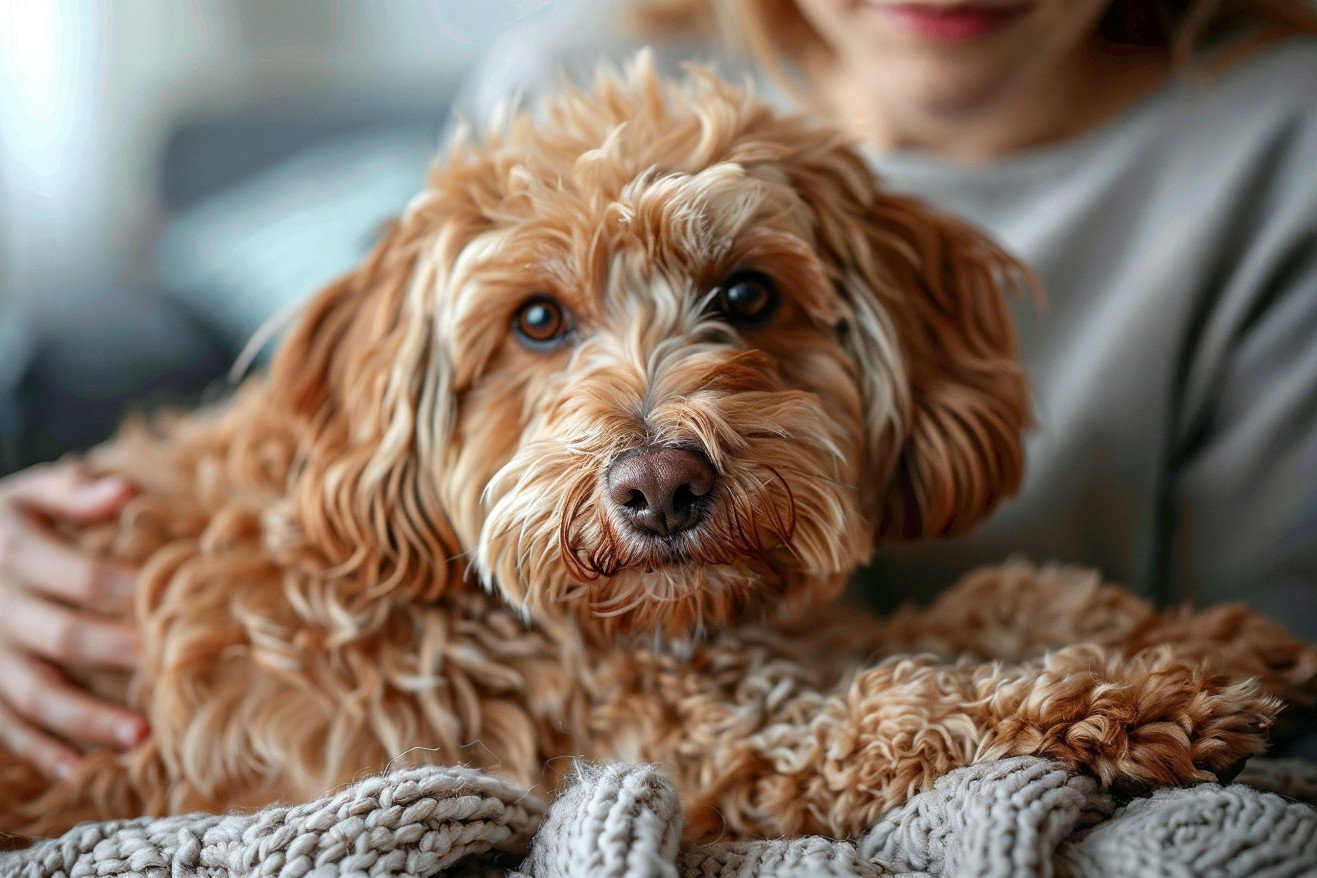How to Comfort a Dog With Pancreatitis: Tips for Soothing Care
16 May 2024 • Updated 14 May 2024

While no pet owner ever wants to think about their dog dealing with pancreatitis, there are ways to help your furry friend feel better when they have this painful condition. Comforting a dog with pancreatitis includes feeding them a bland, low-fat diet, giving them any medications that have been prescribed by the vet, using warm compresses on their belly, and making sure they get plenty of rest so their pancreas can heal.
Dogs need special care and attention as they heal from pancreatitis, and there are a number of things you can do to help them feel more comfortable and heal more quickly. In this article, we'll cover tips from experts on how to create a soothing, supportive environment that will help your dog get through their pancreatitis diagnosis. Based on studies from the fields of veterinary medicine and animal welfare, you'll learn how to comfort your dog in ways that are safe and effective, as well as how to keep an eye on their symptoms and help them get better.
How can I comfort a dog with pancreatitis?
Dietary Management: What to Feed a Dog with Pancreatitis
Dietary management is very important when it comes to helping a dog recover from pancreatitis. When a dog has pancreatitis, the pancreas, which is an organ that produces digestive enzymes, becomes inflamed. To help the pancreas heal and recover, a low-fat, easily digestible diet is recommended. This way, the pancreas won't have to work as hard and won't become inflamed again.
Vets recommend feeding dogs lean proteins like chicken, turkey, or white fish and starchy carbs like white rice, potatoes, or sweet potatoes. Stay away from high-fat foods and foods high in fiber, as these can be hard for your dog to digest. In some cases, dogs may need to eat prescription diets that are designed specifically for dogs with pancreatitis.
It's best to feed your dog several small meals a day, as this will help take the pressure off the pancreas and help your dog digest their food. Don't give your dog fatty treats, human food, or make any sudden changes to their diet, as these can cause the pancreas to become inflamed again. Instead, slowly transition your dog to their new diet and keep an eye on how they're doing. If you have any questions, ask your vet or a pet nutritionist for help and advice.
Pain Management: Helping Your Dog Feel Better
Pain management is important for dogs with pancreatitis because if pain is not addressed, it can lead to other issues and a longer recovery time. In a study published in PMC, the authors explain that the basic treatment goals for pancreatitis in dogs include "replacing fluid losses, maintaining hydrostatic pressure, controlling nausea and providing pain relief."
Opioids are currently the analgesic of choice for dogs with pancreatitis, with full μ-opioid agonists like fentanyl being used for more severe cases and partial μ-opioid agonists like buprenorphine being used for less severe cases. Today's Veterinary Practice explains that ketamine and/or lidocaine continuous-rate infusions can also be used in cases of uncontrolled pain or to decrease opioid requirements. It's important to make sure that you're giving your dog any pain medications as directed by your vet.
It's also important to make sure that you're monitoring your dog for pain and that you know what to look for. Signs of pain in dogs include vocalization, guarding, or withdrawal when the abdomen is palpated. As discussed in Today's Veterinary Practice, a multimodal pain management plan that includes both medications and other supportive care is often the most successful way to manage pain in dogs with pancreatitis.
Natural and Home Remedies for Pancreatitis
In addition to traditional veterinary medicine, natural and home remedies can be an important part of helping a dog heal from pancreatitis. Only Natural Pet explains that supplements like digestive enzymes, probiotics, and antioxidants can help "ensure good health and support digestion" while a dog is healing. In addition, herbs like milk thistle, ginger, and turmeric can help support liver health.
It's also important to make sure that the dog is in a supportive home environment. Dr. Peter Dobias suggests that dogs should fast for at least 48 hours to "rest the pancreas" and then be fed a diet of 50/50 pumpkin or squash and lean meat. Acupuncture and homeopathy can also be used to help with the pain and nausea that come with pancreatitis, according to Dogs Naturally Magazine.
That said, it's important to talk to a vet before starting any new home remedies or treatments. Natural and home remedies should be used in conjunction with, not instead of, traditional medical treatment. By using a combination of traditional and natural treatments, you can make sure that your dog gets the comprehensive care they need to heal from this serious condition.
How to Create a Comfortable Space for Recovery
While it’s important to make sure that your dog is eating the right foods, it’s also important to make sure that your dog is in a comfortable environment. JustFoodForDogs explains that pancreatitis can make dogs more vulnerable and emotional, so making sure that they are in a safe and comfortable environment is just as important as making sure that they are eating the right things. This means that you should make sure that you have a dedicated recovery area set up with a high-quality pet bed, like the Bella&Toby dog bed, that will help your dog feel safe and comfortable.
You should also make sure that you have potty pads nearby in case of accidents. In addition, you should make sure that you are interacting with your dog gently and minimizing the amount of time that they are being disturbed. This is especially important because, as Bailey's CBD explains, dogs with pancreatitis tend to have sore abdomens. You should also make sure that your dog is getting plenty of rest and that they are not engaging in any strenuous activities until they have fully recovered.
By making sure that you are creating a comfortable environment that is tailored to your dog’s specific needs, you can help them feel more comfortable and help them recover from this condition.
How to Prevent Future Pancreatitis Episodes
Preventing future pancreatitis episodes is important for dogs that have dealt with this painful condition. As explained by Bond Vet, it is important to be proactive after a case of pancreatitis to minimize the chances of a recurrence. This includes sticking to a consistent low-fat diet, since fatty foods can cause the pancreas to become inflamed again.
The VCA Animal Hospitals also advises against giving dogs table scraps and urges pet parents to be more careful about dietary indiscretions, which is when dogs accidentally eat high-fat human foods. It is also important to make sure that dogs stay at a healthy weight by keeping up with regular exercise, as obesity is a leading cause of pancreatitis.
In addition, regular vet visits and keeping an eye out for potential symptoms, such as abdominal discomfort and a loss of appetite, can help ensure that any future episodes are caught early. As mentioned by All About Dog Food, it is important to make sure that you are following your vet's advice, including sticking to any dietary restrictions or supplements, and that you are treating any other health issues that may make dogs more susceptible to pancreatitis.
By being proactive, you can help make sure that your dog doesn't have to deal with the pain of another episode of pancreatitis and that you can help them stay as healthy as possible in the long run.
Conclusion: How to Help Your Dog Make a Full Recovery
Helping your dog make a full recovery from pancreatitis will require that you provide compassionate care. In this article, we've discussed the importance of following your vet’s advice, feeding your dog a low-fat diet, managing pain, and ensuring that your dog is in a comfortable, stress-free environment.
It’s also important to be patient and persistent during the recovery process, as it may take a while for your dog to get back to their normal self. Keep a close eye on your dog’s symptoms and how they are feeling, and don’t be afraid to reach out to your vet if you have any questions or concerns. With the right care and attention, most dogs can recover from pancreatitis.
Your dog is counting on you to be patient and kind as they work to overcome pancreatitis. By following the expert advice provided in this article, you can help your dog recover from this condition and get back to their normal, happy, and healthy life.


